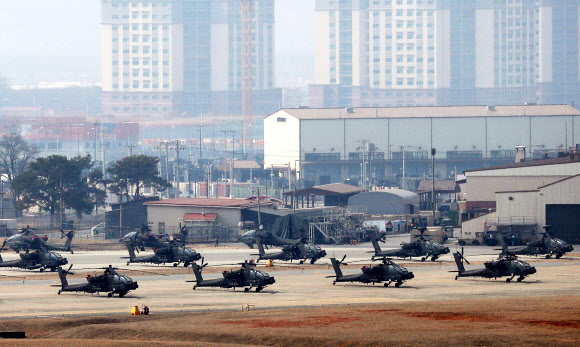 |
|
The US Army garrison at Camp Humphreys in Pyeongtaek, Gyeonggi Province. (Yonhap News)
|
MND explains decision reflects two countries’ support for N. Korea-US diplomacy
As of this year, South Korea and the US have decided to halt their Key Resolve and Foal Eagle joint military exercises, which have been held each year. This sends a strong signal that the diplomatic process will continue, along with military efforts to support that process, despite the failure of US President Donald Trump and North Korean leader Kim Jong-un to reach an agreement in their second summit, which ended in Hanoi, Vietnam, on Feb. 28. South Korea’s Ministry of National Defense (MND) announced on Mar. 3 that this decision had been made by Defense Minister Jeong Kyeong-doo and acting US Secretary of Defense Patrick Shanahan in a telephone call on the evening of Mar. 2. The Key Resolve command post exercises will be replaced by exercises with the Korean name “Dongmaeng,” meaning “alliance,” while the Foal Eagle field mobility exercises will be reduced to mostly battalion-level drills held throughout the year without any special name. The phone call between South Korea and the US defense ministers took place less than two days after the end of the North Korea-US summit in Hanoi. The two countries apparently agreed to take this step to prevent the situation from deteriorating after the summit ended without a deal and to maintain the momentum of future negotiations. The MND explained that Jeong and Shanahan had “made clear that this alliance decision was a measure that reflected the two countries’ desire to support diplomatic efforts to achieve the complete denuclearization of the Korean Peninsula through measures that are final and fully verifiable.” The US’ decision can also be regarded as military compensation for Kim Jong-un’s statement during the North Korea-US summit that he’s willing to provide a written promise that the North will permanently halt its nuclear weapon tests and missile test launches. In his post-summit press conference at the JW Marriott Hotel Hanoi, Trump repeatedly emphasized that Kim had promised there would be “no more testing” of nuclear weapons and ICBM launches. When asked about whether South Korea and the US would resume their joint military exercises, Trump said, “I gave that up quite a while ago.” The Key Resolve exercise is a simulated war game carried out on computers, with the aim of honing the swift deployment of US troops to the Korean Peninsula in the event of a crisis. Since 2008, these exercises have been spearheaded by the South Korean military as part of preparations for the transfer of wartime operational control, known as OPCON, from the US to South Korea. An assessment of initial operational capability (IOC), the first stage in verifying the conditions for the OPCON handover, is supposed to take place this year. The new command post exercises, which have been named Dongmaeng, will take place from Mar. 4 to 12, which is half the length of the previous exercises. The name of the exercise will reportedly reflect the year in which it’s being held in the manner of “19-1 Dongmaeng.” Foal Eagle is a field mobility exercise that involves actual troops and equipment. It was called by that name from 1975 until 2008, when it was merged with Key Resolve. North Korea has always taken issue with these exercises, which have mobilized a large amount of troops and military equipment at a specific time. “We’ll be splitting up the troops and spreading out the exercises so that we can guarantee the actual substance while moving away from the ostentatious approach of the past,” said an official from South Korea’s Defense Ministry. No strategic US assets have been deployed to Korea following Singapore summit As part of this decision, the US is projected to continue refraining from deploying strategic weaponry – including B-1B bombers, aircraft carriers and F-22 stealth fighters – to the Korean Peninsula. No strategic US assets have been deployed to the Korean Peninsula since South Korea and the US suspended the Ulchi-Freedom Guardian joint exercises and the Vigilant Ace aerial drills after the first North Korea-US summit in Singapore on June 12, 2018. In his New Year’s address this year, Kim Jong-un said that North Korea wanted the South to stop conducting joint military exercises with foreign powers and to stop allowing foreign strategic assets to enter the Korean Peninsula. During a speech at the Conservative Political Action Conference, which was held at National Harbor, Maryland, on Mar. 2, Trump said that the Hanoi summit was not a failure. “We learned a lot over the last couple of days,” Trump was quoted as saying by Reuters. "North Korea has an incredible, brilliant, economic future if they make a deal. But they don't have any economic future if they have nuclear weapons,” Trump said. By Yoo Kang-moon, senior staff writer, and Lee Bon-yeong, staff reporter Please direct comments or questions to [english@hani.co.kr]






